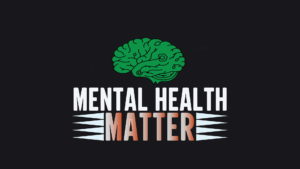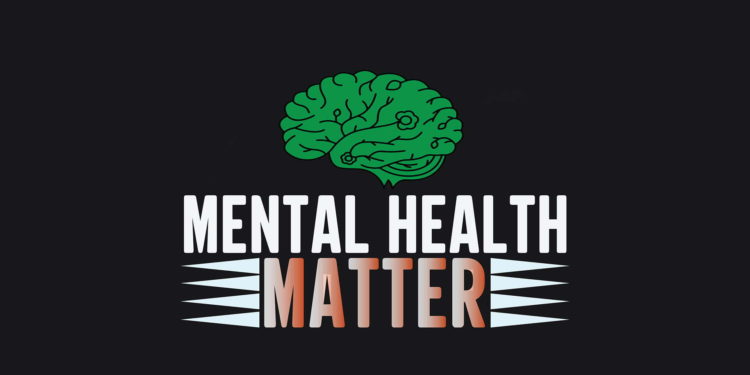Mental Health Matters because it equally exists, impacts, and influences the life of a person and general Well-Being. Mental health is a subject that values our knowledge and consideration. It is a fact that in a society where importance is often placed on physical health and appearances, mental health is often misunderstood and is not given much importance.
It is time to accept the importance of mental health, which is essential to both our general well-being and quality of life.
It happens that things that are not seen often have strong impacts and mental health is one of them.
Our emotional, psychological, and social well-being is all referred to as mental health. It has an impact on our thoughts, feelings, and behaviors and is vital for stress management, making wise decisions, and keeping firm personal bonds. Mental health is just as important to the normal process of our minds as physical health is to the proper process of our bodies.
Mental Health Matters because otherwise we would be stuck in what our body wants and would not understand the signals.
The Significance of Mental Health can be taken from this point that it is vital for people, communities, and the broader society. It is not just an issue of an individual.
Why Mental Health Matters?

Well, why it would not matter when it has an intense impact on life.
The thoughts, feelings, and behaviors of people in daily life are influenced by their mental health, which is a fundamental factor of overall well-being. It has a big impact on their quality of life and helps them have healthy relationships, a high sense of self-worth, and the capacity to overcome obstacles in life.
Here self-worth is important because if you are insecure and your inner is weak, how would you stay strong in life which is important. It is also important because otherwise your personality would be shattered.
Furthermore, there is a close connection between physical and mental wellness. Mental Health Matters because People who struggle with mental health concerns are more likely to experience physical health issues. Then again, problems with physical health can also negatively affect the mental health of a person, underlining the relationship between the two.
Let us get broader; mental health is fundamental not only for personal well-being but also for performance and productivity in the workplace and in school. Individuals who are in good mental health are more likely to be successful in their activities, make wise judgments, and be productive. However, mental health problems can also result in lower output, absenteeism, and worse performance in the workplace or at school.
Relationship quality and Well-Being are strongly influenced by mental health. Building and sustaining healthy relationships depends on mental health and mental health problems can stress these bonds and even spark arguments. Consequently, having supportive connections can benefit mental health.
Mental Health Matters because Student success in educational settings is highly dependent on their mental health. Students who are in better mental health are more able to concentrate, learn, and succeed academically. Prioritizing mental health and Well-Being in schools nurtures a cultivating environment that is beneficial to academic and emotional growth in students.
Mental Health Matters as it benefits communities because people are more inclined to volunteer, participate in community activities, and improve the well-being of others. And more strong society is raised by a collective focus on mental health.
Reducing the stigma attached to mental illness is also dependent on improving mental health. Here the question is how to break the myths about mental health?
It means seeking assistance when necessary, talking about it, and taking it as seriously as anyone would do with physical health which leads to better results and a more sympathetic and helpful community.
Mental health is important since it affects success, the well-being of everyone both individually and collectively, and the general well-being of society. A world that is healthier, more compassionate, and more productive can only be achieved by addressing mental health challenges.
Mental Health Matters For All

Be it General Well-Being, Productivity, and Fulfillment, Life Quality, Flexibility, Mental health is a global issue that impacts individuals of different ages, socioeconomic origins, and lifestyles. Mental health is a common thread that runs through all of our lives, whether we are students, parents, professionals, or retirees. We all go through this together, and as we help one another to take care of our mental health, the community grows stronger and more caring.
Mental Health Matters as it counts just as much, if not more, in a world where physical health and appearances are frequently prioritized. It is the core of our identity, the foundation of our strength, and the secret to our general well-being.
By recognizing the importance of mental health and encouraging candid discussions about it, we can build a community in which everyone has access to the knowledge and resources they require to flourish emotionally and mentally. It’s time to give mental health and Well-Being the attention they deserve and see it as an integral aspect of our lives.
The Fundamentals of Mental Health

Emotional, psychological, and social well-being are all included in Mental Health Matters. It encompasses more than just the absence of mental disease; it also includes having positive traits and being able to overcome obstacles in life. Essentially, it is how we feel, think, and behave under different conditions that shape our point of view on life, relationships, and self-care. It is a broad matter in a broad spectrum of life.
The fundamental ideas and concepts that support our psychological well-being are included in the field of mental health fundamentals. These foundational concepts are necessary to understand and sustain mental wellness. These fundamentals are important to briefly understand the subject of mental health.
Mental Health Awareness: The first step is to understand what mental health is, why Mental Health Matters, and how important it is. Emotional, psychological, and social happiness are referred to as mental health, and they have an impact on people’s thoughts, feelings, and behaviors in daily life.
Emotional Well-Being: An essential component of mental health is the emotions. It is essential to recognize, understand, and control one’s emotions. The ability to identify and communicate emotions in an appropriate manner is a fundamental component of emotional intelligence, which is necessary for preserving mental wellness.
Psychological Resilience: The capacity to overcome hardship and adjust to life’s obstacles is known as resilience. Building coping mechanisms, problem-solving abilities, and an optimistic view of well-being in life are all part of developing resilience. Maintaining mental health in the face of stress and challenging circumstances requires resilience.
Risk and Protective Factors: It is fundamental to understand the variables that may have an impact on mental health. While protective variables increase an individual’s resilience and well-being, risk factors can increase an individual’s vulnerability to mental health problems.
Stigma Reduction: A key component of nurturing well-being is dismissing the stigma attached to mental health. Stigma can keep people from getting the assistance they need, which can result in therapy that is either delayed or insufficient.

Access to Support and Treatment: For those in need of mental health treatment, having access to mental health services such as counseling, therapy, and medication is essential because Mental Health Matters. Sufficient support networks can have a big impact on managing and recovering.
Early intervention and prevention: Preventive measures can lessen the likelihood that mental health illnesses will be obvious. Improving long-term results requires treating problems early on before they get worse because Mental Health Matters.
Self-Care: It is essential to encourage self-care behaviors. People can control their mental health by using tactics like consistent exercise, a healthy diet, enough sleep, and stress reduction methods.
Mental Health Education: Raising awareness through education can assist in de-stigmatizing mental health conditions. Broaden knowledge about prevalent mental health issues and how to get treatment.
The Ending Notes
To cut a long story short, Mental Health Matters and it should be enough.
Mental health is a universal issue that impacts individuals of different ages, socioeconomic backgrounds, and life experiences with their Well-Being.
The conditions of our hearts and minds are similar. Knowing that makes it easier for us to show kindness to those who might be in need.
Thus, avoid passing judgment on people who are struggling with mental health issues. Let’s take the lead in promoting understanding.
Here it is important to ask yourself:
- What is your current situation and what steps can you take to improve your mood?
- How can we connect the strength when times are tough?
- In what ways might we value and benefit from the distinctions of mental health?
- What tiny acts of self-care can you perform each day to lift your spirits?
- Who are your trusted supporters, and how can you strengthen your relationships with them?
- When you consider your own mental health, what do you perceive, and what can you do to improve it?
Kindness and compassion are a never-ending path especially when Mental Health Matters for Well-Being.













